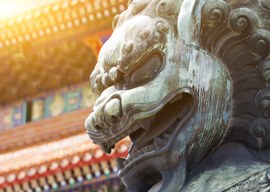
October 03, 2014

Source: Shutterstock
Americans are caught up with the Ebola crisis and the Secret Service lapses in protecting the White House and the president’s family. But what is transpiring in Hong Kong may be of far greater consequence.
Last weekend, Hong Kong authorities used pepper spray and tear gas to scatter the remnants of a student protest of the decision to give Beijing veto power over candidates in future elections.
The gassing was a blunder. Citizens poured into the streets in solidarity with the protesters. Hong Kong police lacked the nerve or numbers to remove them. The People’s Liberation Army stayed in its barracks. Crowds clamoring for democracy controlled the city.
Now, on Beijing’s orders, authorities have adopted a “wait-them-out” strategy, assuming the silent majority in Hong Kong will get fed up with the Occupy Central protesters, as the Americans did with the Occupy Wall Street protesters.
Beijing, however, is understandably nervous.
To allow students to block the city center and impede traffic shows weakness. Hong Kong’s reputation as a financial center and tourist attraction will suffer. And Beijing cannot permit this to go on too long without risking supportive protests erupting on the mainland.
Nor can the students be allowed to force Hong Kong to give up Beijing’s veto of candidates. To capitulate would expose President Xi Jinping as a leader who can be broken by street action. To permit that perception would imperil Xi’s standing with Beijing’s hard-liners, and potentially the regime itself.
Thus if the protesters do not vacate Hong Kong’s streets soon, they may have to be removed. And Beijing is not a regime to recoil from force if it has run out of other options.
The last democracy protests, 25 years ago in Tiananmen Square, were crushed by tanks, with hundreds dead. The Falun Gong religious movement was crushed. Protests by Tibetans and Uighurs demanding autonomy have been met with force and massive neo-Stalinist population transfers of Han Chinese into Tibet and Xinjiang.
Xi Jinping is no Mikhail Gorbachev. The people do not decide in his China. The party does. He does. He is more in the mold of the Leonid Brezhnev of 1968, who ordered Warsaw Pact tank armies in to put an end to the Prague Spring.
Hong Kong is also a microcosm of the world’s ideological conflicts—between democracy and authoritarianism, pluralism and nationalism.
American elites may sing psalms to multiculturalism. But in China, on the 65th anniversary of the revolution where Mao declared, “China has stood up!” nationalism is surging.
China’s claim to all the islands, shoals and rocks in the South China and East China seas, her warnings to Vietnam, Japan and the United States to stay clear, are cheered. Xi Jinping is seen as a nationalist and unyielding defender of China’s historic rights.
Vladimir Putin, a Russian nationalist, is the most popular foreign leader in China for taking back Crimea after a U.S.-backed coup in Kiev.
Putin’s campaign against NGOs in Moscow, which he sees as U.S.-financed centers of subversion, is being watched in Beijing, and similar charges are being made against U.S.-backed NGOs in Hong Kong.
Prime Minister Shinzo Abe has appealed to Japanese nationalism with his defense of the Senkakus against China and his call for the return of the southern Kuriles seized by Stalin at the end of World War II.
While Abe has suspended his visits to the Yasukuni Shrine to the spirits of Japanese warriors, including Hideki Tojo, his party members still make the visitations.